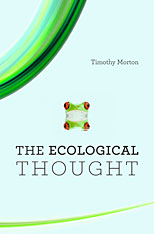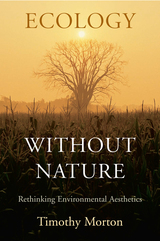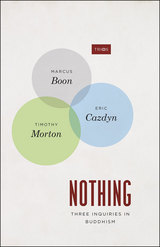
In this passionate, lucid, and surprising book, Timothy Morton argues that all forms of life are connected in a vast, entangling mesh. This interconnectedness penetrates all dimensions of life. No being, construct, or object can exist independently from the ecological entanglement, Morton contends, nor does “Nature” exist as an entity separate from the uglier or more synthetic elements of life. Realizing this interconnectedness is what Morton calls the ecological thought.
In three concise chapters, Morton investigates the profound philosophical, political, and aesthetic implications of the fact that all life forms are interconnected. As a work of environmental philosophy and theory, The Ecological Thought explores an emerging awareness of ecological reality in an age of global warming. Using Darwin and contemporary discoveries in life sciences as root texts, Morton describes a mesh of deeply interconnected life forms—intimate, strange, and lacking fixed identity.
A “prequel” to his Ecology without Nature: Rethinking Environmental Aesthetics (Harvard, 2007), The Ecological Thought is an engaged and accessible work that will challenge the thinking of readers in disciplines ranging from critical theory to Romanticism to cultural geography.

In Ecology without Nature, Timothy Morton argues that the chief stumbling block to environmental thinking is the image of nature itself. Ecological writers propose a new worldview, but their very zeal to preserve the natural world leads them away from the "nature" they revere. The problem is a symptom of the ecological catastrophe in which we are living. Morton sets out a seeming paradox: to have a properly ecological view, we must relinquish the idea of nature once and for all.
Ecology without Nature investigates our ecological assumptions in a way that is provocative and deeply engaging. Ranging widely in eighteenth-century through contemporary philosophy, culture, and history, he explores the value of art in imagining environmental projects for the future. Morton develops a fresh vocabulary for reading "environmentality" in artistic form as well as content, and traces the contexts of ecological constructs through the history of capitalism. From John Clare to John Cage, from Kierkegaard to Kristeva, from The Lord of the Rings to electronic life forms, Ecology without Nature widens our view of ecological criticism, and deepens our understanding of ecology itself. Instead of trying to use an idea of nature to heal what society has damaged, Morton sets out a radical new form of ecological criticism: "dark ecology."


READERS
Browse our collection.
PUBLISHERS
See BiblioVault's publisher services.
STUDENT SERVICES
Files for college accessibility offices.
UChicago Accessibility Resources
home | accessibility | search | about | contact us
BiblioVault ® 2001 - 2024
The University of Chicago Press









